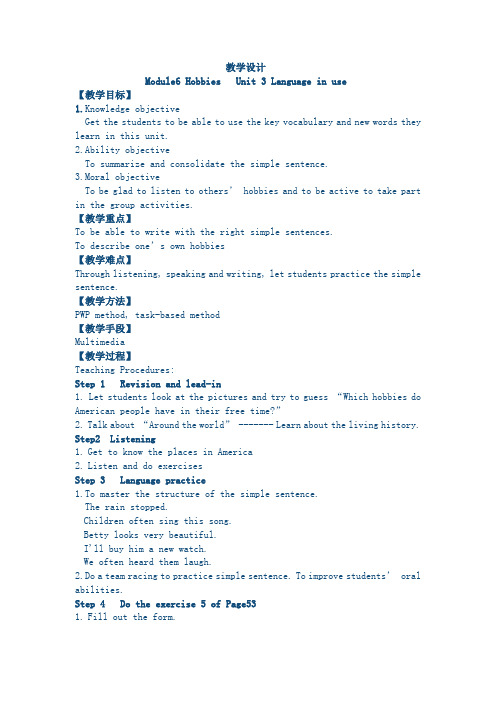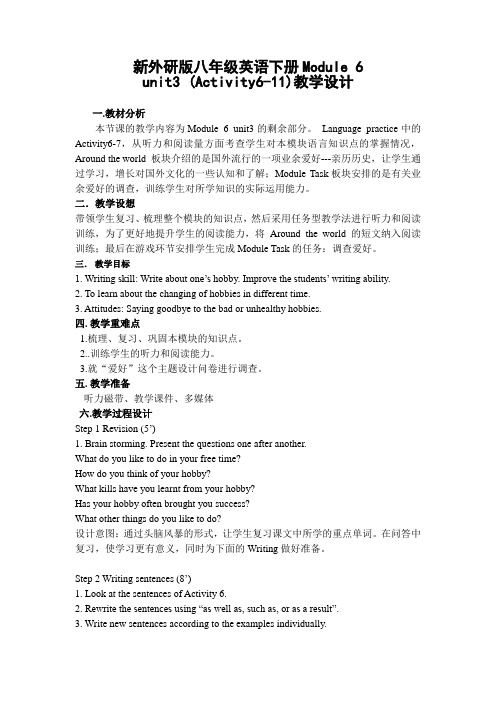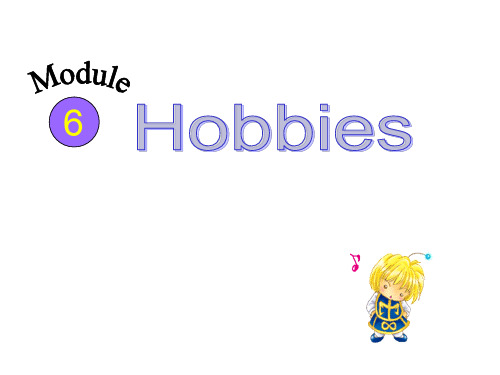2012外研版英语八年级下册Module6 Unit 3
外研版英语八年级下册:Module 6 Unit 3 Language in use. 课程教学设计

教学设计Module6 Hobbies Unit 3 Language in use【教学目标】1.Knowledge objectiveGet the students to be able to use the key vocabulary and new words they learn in this unit.2.Ability objectiveTo summarize and consolidate the simple sentence.3.Moral objectiveTo be glad to listen to others’ hobbies and to be active to take part in the group activities.【教学重点】To be able to write with the right simple sentences.To describe one’s own hobbies【教学难点】Through listening, speaking and writing, let students practice the simple sentence.【教学方法】PWP method, task-based method【教学手段】Multimedia【教学过程】Teaching Procedures:Step 1 Revision and lead-in1. Let students look at the pictures and try to guess “Which hobbies do American people have in their free time?”2. Talk about “Around the world” ------- Learn about the living history. Step2 Listening1.Get to know the places in America2.Listen and do exercisesStep 3 Language practice1.To master the structure of the simple sentence.The rain stopped.Children often sing this song.Betty looks very beautiful.I'll buy him a new watch.We often heard them laugh.2.Do a team racing to practice simple sentence. To improve students’ oral abilities.Step 4 Do the exercise 5 of Page531.Fill out the form.2.Make sentences by using the words and phrasesStep 5 Reading1. Do the exercise 4 of Page532. Fill out the blanks.3.Do reading practice according to the passage.(Ask and answer)4.Teaching them some useful reading methods.Step 6 Composition writingThe title: My hobbyContents:what’s your hobby and why?The story about your hobbySomething more about your hobby?1.Give the students a possible version.2.Ask them to write a composition about their hobbies.3.Give them some suggestions about hobbies:. Hobbies are good for people.Hobbies can make us relax.Hobbies can develop our interests.Hobbies can help us learn new skills.Step7 Homework1.Write a short passage. Introduce your ownhobby and what it has brought to your life.2. Complete Activity 7 on page 54.3. Oral work: Do your survey with other studentson hobbies.。
外研版英语八年级下Module6 Unit3课件(共36张ppt)

tidying up my room yesterday, I found an When I was (1) ___________ old box of my father’s. He gave it to me two years ago. It was really (2) interesting _________ to discover something about my father’s
Read the passage and complete the notes.
A fantastic hobby A British boy has become one of the youngest people to sail alone across the Atlantic Ocean. Seb Clover has a fantastic and exciting hobby. He sailed his 9.8- metre-long boat 5,000 km from Tenerife to Antigua. Fifteen-year-old Seb said, “Sometimes I was afraid. But I still enjoyed every moment. The best thing was seeing fish and other sea animals swimming close to the boat.” He was also very happy to arrive in Antigua.
model ship from Australia. My father Germany and a small (8)______
even kept the (9)_____ ticket from his first football match. It made me think about my hobby. I want to keep my old picture books and magazines for a long time a person.
新外研版八年级英语下Module6Unit3(Activity6--11)教学设计

新外研版八年级英语下册Module 6unit3 (Activity6-11)教学设计一.教材分析本节课的教学内容为 Module 6 unit3的剩余部分。
Language practice中的Activity6-7,从听力和阅读量方面考查学生对本模块语言知识点的掌握情况,Around the world 板块介绍的是国外流行的一项业余爱好---亲历历史,让学生通过学习,增长对国外文化的一些认知和了解;Module Task 板块安排的是有关业余爱好的调查,训练学生对所学知识的实际运用能力。
二.教学设想带领学生复习、梳理整个模块的知识点,然后采用任务型教学法进行听力和阅读训练,为了更好地提升学生的阅读能力,将Around the world 的短文纳入阅读训练;最后在游戏环节安排学生完成Module Task的任务:调查爱好。
三.教学目标1. Writing skill: Write about one’s hobby. Improve the students’ writing ability.2. To learn about the changing of hobbies in different time.3. Attitudes: Saying goodbye to the bad or unhealthy hobbies.四. 教学重难点1.梳理、复习、巩固本模块的知识点。
2..训练学生的听力和阅读能力。
3.就“爱好”这个主题设计问卷进行调查。
五. 教学准备听力磁带、教学课件、多媒体六.教学过程设计Step 1 Revision (5’)1. Brain storming. Present the questions one after another.What do you like to do in your free time?How do you think of your hobby?What kills have you learnt from your hobby?Has your hobby often brought you success?What other things do you like to do?设计意图:通过头脑风暴的形式,让学生复习课文中所学的重点单词。
2012外研版英语八年级下册Module6 Unit 3

My grandfather loves writing too ________________________________.
4. My mother bought us a lot of books. He gave me a lot of books __________________________. 5. Reading can make you clever. Writing can make you happy ____________________________. 6. There are many interesting facts in books.
6. there be + 主语+ 状语 主语由名词充当, be动词的单复数由与其临 近的名词的单复数形式决定。 There are many story books in his schoolbag. There is a very nice cup on the table.
There is a pen and two books on the desk.
Mary showed me her new skirt.
(me是间接宾语,her new skirt是直接宾语) His hobby has brought him enjoyment. My father bought me a very good bike on my birthday. Last week, my aunt sent me a box of chocolate.
(1) “主语 + 及物动词 + 间接宾语 + 直接宾 语”。在表达时,常常是间接宾语在前, 直接宾语在后。如:
This term Mr Wang teaches us Chinese.
外研版英语八年级下册Module6 Unit3 教材知识详解

Module6 Unit3 教材知识详解1. You are busy all the time on a boat alone.你一直一个人在船上忙碌。
all the time意为“一直,始终”,相当于always,常放在句尾作状语,修饰谓语动词,always通常放在句中。
如:He walks to school all the time.=He always walks to school.他总是步行上学。
on time 准时;have a good time 玩得开心;for the first time 首次;in time 及时;from time to time 时常。
2. I ran out of chocolate!我吃光了巧克力!run out of意为“用完(某物)”,相当于及物动词,后接宾语,并可用于进行时,主语通常是人。
① run out 指“某物用完了”,为不及物动词词组,不能用于被动语态,主语通常是表示时间、食物、金钱等事物的名词。
如:My money has run out.=I have run out of my money.我的钱用完了。
②run out of…也可作“从……跑出”解。
如:He ran out of the classroom.他从教室里跑了出来。
3.Seb has sailed boats since he was very young and started to get ready for this journey when he was only twelve.赛巴从很小就开始驾船航行,当他只有十二岁时就开始准备这次旅行。
be ready for与get ready for意义相近,意为“为……做好准备”,都接名词或代词。
但前者侧重状态,后者则侧重动作。
如:We are ready for the final examination.我们已为期末考试做好准备。
外研版八年级下册英语Module6 Unit3公开课课件

英语五种基本句型列式如下: 基本句型一: S+V (主+谓) 基本句型二:S+V+P (主+系+表) 基本句型三: S+V+O (主+谓+宾) 基本句型四: S+V+O +O
Read the passage and complete the notes.
A fantastic hobby
A British boy has become one of the youngest people to sail alone across the Atlantic Ocean. Seb Clover has a fantastic and exciting hobby. He sailed his 9.8- metre-long boat 5,000 km from Tenerife to Antigua.
Complete the passage with the correct form of the words and expressions in the box.
as a result fan hobby interesting model stamp such as ticket tidy up
(主+谓+间宾+直宾) 基本句型五:S+ V +O+ C
(主+谓+宾+宾补)
“That’s easy to answer, ”said Seb. “I ran out of chocolate! ” 赛博说: “很容易回答, 我吃光了巧克力! ” 【自主领悟】run out of为及物动词短语, 意为“用完; 耗尽”, 表示主动, 主语只能是人。后接名词或代词作宾语。例如: He always runs out of money before pay day. 他总是发工资的日 子还没到就把钱花完了。
外研版八年级英语下册初二Module 6 Unit3课件

as a result fan hobby interesting model stamp such as ticket tidy up
He wrote to people from all over the world, and they sent him letters back. (4)__A_s_a__re_s_u_l_t_, he had a book of interesting (5) _s_ta_m__p_s_. People also gave him things from different countries, (6) _s_u_c_h__a_s_ a silk (7) __fa_n__ from China, a little
2 Work in pairs. Look at the picture. Ask and answer the questions about the activities in it. 1 Which activity do you think is the most interesting? 2 Which skills do you have? 3 Which skill do you want to learn most? Why? 4 Which skill do you think would be the most useful for
Module 6 Hobbies
Unit 3 Language in use
Language practice
David Smith is a student. It came out as a book in 2012. David wrote a story about the life of a sixteen-year-old boy. Hobbies can make you grow as a person. I will show you my stamps too. There was a writing class.
外研版英语八年级下册Module6 Unit3 精品课件

1. Which activity do you think is the most interesting? 2. Which skills do you have? 3. Which skill do you want to learn most? Why? 4. Which skill do you think would be the most useful for
the writer of the books, J.K.Rowing, has become very famous. 5. I buy the magazines when they __co_m__e_o_u_t_ each month.
4 Complete the passage with the correct form of
1. In my spare time, I read. In my spare time, I __w__ri_te___.
2. My hobby is reading. My hobby _i_s_w__ri_ti_n_g___________.
3. My mother likes reading too. _M_y__g_ra_n_d_f_a_th_e_r__lo_v_e_s_w__ri_ti_n_g__to_o___.
4. My mother bought us a lot of books. _H_e_g_a_v_e__m_e__a_l_o_t _o_f _b_o_o_k_s________.
5. Reading can make you clever. _W_r_i_ti_n_g_c_a_n_m__a_k_e_y_o_u__h_a_p_p_y______.
6. There are many interesting facts in books. T__h_er_e__ar_e_m__a_n_y_g_o_o_d__s_to_r_ie_s__in__b_o_o_k_s___.
- 1、下载文档前请自行甄别文档内容的完整性,平台不提供额外的编辑、内容补充、找答案等附加服务。
- 2、"仅部分预览"的文档,不可在线预览部分如存在完整性等问题,可反馈申请退款(可完整预览的文档不适用该条件!)。
- 3、如文档侵犯您的权益,请联系客服反馈,我们会尽快为您处理(人工客服工作时间:9:00-18:30)。
in the future.
activity
3. 主语+ 谓语(及物动词)+宾语(+状语)
谓语是及物动词, 后可直接接名词或代词。
I bought a very good book yesterday. My father loves pictures of cars. Every morning, my mother prepares
breakfast for me.
There are two books and a pen on the desk.
Read the sentences and pay attention to their structures. Write new sentences.
1. In my spare time, I read. In my spare time, I _______. write 2. My hobby is reading. is writing My hobby _______________. 3. My mother likes reading too.
Complete the sentences with the correct form of the words or expressions in the box.
activity as a result come out pleasure success pleasure from my hobbies. 1. I get lots of __________ 2. I like doing outdoor _____________ best. activities success 3. I hope David will have great ___________
4. 刚才他替父亲写了一封信。 He _________ a letter _________ his father wrote for just now. 5. 我妈妈为我做了一条鱼。 My mother _________ cooked a fish ______ for _____. me 6. 这个女孩用英语给我们唱了首歌。 The girl ______ a song in English. sang _______ us The girl sang _____ ______in a _____ song ______ for us English.
(1) “主语 + 及物动词 + 间接宾语 + 直接宾 语”。在表达时,常常是间接宾语在前, 直接宾语在后。如:
This term Mr Wang teaches us Chinese.
He gave me a bike.
(2) “主语 + 及物动词 + 直接宾语 + 介词to /for + 间接宾语”。在具体表达时,可以将 直接宾语提前。如果直接宾语在前,间接宾 语在后,这时要根据具体的意思在间接宾语
Mary showed me her new skirt.
(me是间接宾语,her new skirt是直接宾语) His hobby has brought him enjoyment. My father bought me a very good bike on my birthday. Last week, my aunt sent me a box of chocolate.
Unit 3 Language in use
Can you give us some advice about hobbies? 1.Choose creative hobbies such as painting and writing because they can give us new skills. 2. Choose some sports because they are good for our health. 3. Don’t spend too much time on your hobby. 4. Don’t spend all your free time on your favourite hobby. 5. Try to do something new or different.
5. 主语+ 谓语(及物动词)+ 宾语+ 宾语补足语 (+状语) 宾语补足语是补充说明宾语的情况。作宾语 补足语的词通常是名词、动词、形容词、副 词、动词不定式或动名词等。 We can help you develop new skills. I don’t want you to work too hard. The news made evece meal for me.
Complete these sentences.
1. Pass me the salt, please.
Please pass the salt to me 2. I gave him a big present.
I gave a big present to him .
6. there be + 主语+ 状语 主语由名词充当, be动词的单复数由与其临 近的名词的单复数形式决定。 There are many story books in his schoolbag. There is a very nice cup on the table.
There is a pen and two books on the desk.
具有方向性动作的双宾语动词,其后面的间 接宾语后置时,通常加介词to。to sb.侧重于 “给某人”,表示某人接受或收到了某物。 此类动词常见的有:bring, give, leave, lend, pass, return, send, show, take, throw, hand, teach等。 Pass the English dictionary to me.
六种基本句型
英语以动词为中心组成六大句型。 1. 主语+ 系动词+ 表语(+状语)
常见的系动词有be 的不同形式、 look、 feel、 taste、 sound、 smell、 get、 keep 等, 其后常接形容词作表语。 These books are great. Tom is very happy today.
“主语 + 动词 + 直接宾语 + 介词to / for + 间 接宾语”的句型可根据句子的意思与“主语
+ 及物动词 + 间接宾语 + 直接宾语”进行互
换。如:
Please give me that book.
= Please give that book to me.
My mother cooked me a nice meal.
前加上相应的介词。如:
My parents bought some storybooks for me.
They gave a lot of storybooks to us.
(3)“for + 间接宾语”与“to + 间接宾语”的 区别 具有“为……而做”的含义的双宾语动词其 间接宾语后置时,间接宾语要加介词for。for sb. 侧重于“为某人”,意为“帮助某人做某 事;为某人提供某种服务”表示动作的“目 的”;此类动词常见的有:buy, read, sing, make, build, mend, cook, fetch等。如: My father makes a kite for me every spring.
He wrote a book in senior high school.
4. 主语+ 谓语(及物动词)+ 间接宾语(人)+直接宾
语(物)(+状语) / 主语 + 及物动词 + 直接宾语 +
介词to /for + 间接宾语 谓语是及物动词,后可接名词或代词。常见的能 接双宾语的动词有give, show, pass, teach, send, buy, make, draw, do, get, cook等。 也就是说这类动词后面可以出现两个动作的承 受者,后跟两个宾语。一般来说,指人的通常 是间接宾语,表示动作是对谁做的或为谁做的; 指物的通常是直接宾语,是动作所涉及的物。
Analyse the following sentences.
1. He looks happy. 2. The rain stopped just now.
3. He bought a book last Sunday.
4. His father bought him a computer. 5. I made him clean the room. 6. There is a book on the desk.
.
3. My mother makes me a birthday cake every birthday. Every birthday my mother makes a birthday cake for me .
4. Yesterday she bought me a pen. Yesterday she bought a pen for me 5. She showed her new watch to me. .
There are many good stories in the book __________________________________.
Look at the picture. What activities does it show?
1.Which activity do you think is the most interesting? 2. Which skills do you have? 3. Which skill do you want to learn most? Why? 4. Which skill do you think would be the most useful for young people?
